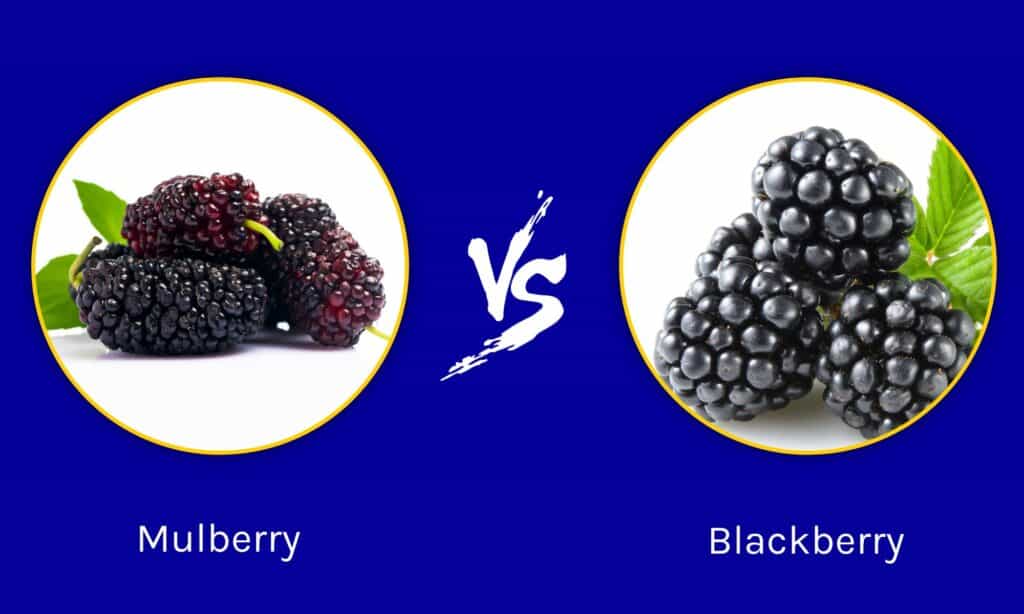A Delectable Duel: Mulberry vs Blackberry
Mulberries and blackberries are two popular and versatile berries that offer a delightful burst of flavor. In this article, we will explore the characteristics, nutritional value, culinary uses, cultivation, and availability of mulberries and blackberries. By comparing these two berries, we aim to provide a comprehensive understanding of their unique qualities and help you appreciate their distinct flavors.

Mulberry: Nature’s Sweet Treat
Overview of Mulberries
Mulberries are small, sweet berries that come in various colors and sizes. They can be black, red, purple, or white and have a soft and juicy texture. Mulberries are known for their mildly sweet and tart flavor, which is often compared to a mix of blackberries and raspberries. Some common types of mulberries include red mulberries, black mulberries, and white mulberries.
Nutritional Value of Mulberries
Mulberries are packed with essential nutrients. They are a good source of vitamin C, vitamin K, iron, and dietary fiber. These berries are also rich in antioxidants, such as anthocyanins, which help protect the body against oxidative stress and inflammation. Consuming mulberries may contribute to improved digestion, heart health, and immune function. However, it’s important to note that some individuals may be allergic to mulberries, so caution should be exercised.
Culinary Uses of Mulberries
Mulberries are incredibly versatile in the kitchen. They can be enjoyed fresh, added to smoothies, or used as a topping for yogurt and cereal. These berries are also commonly used in jams, jellies, and desserts like pies, tarts, and cakes. Mulberry preserves and sauces are popular accompaniments to savory dishes as well. Their sweet and tangy flavor adds a delightful twist to a wide range of recipes.
Cultivation and Availability
Mulberries are native to several regions around the world, including Asia, Europe, and North America. They thrive in temperate climates and are typically grown in home gardens or commercial orchards. Mulberries are generally available during the summer months, with some variations depending on the specific type and location. These berries require well-drained soil and sufficient sunlight to grow, making them relatively easy to cultivate.
Blackberry: The Bold and Berried
Overview of Blackberries
Blackberries are delicious berries that are characterized by their dark color, juicy texture, and sweet-tart flavor. They are typically black or dark purple, although some varieties may have a reddish hue. Blackberries are known for their unique combination of sweetness and tanginess, making them a favorite among berry enthusiasts. Common types of blackberries include the thorny blackberry, thornless blackberry, and wild blackberry.
Nutritional Value of Blackberries
Blackberries are a nutritional powerhouse. They are rich in vitamin C, vitamin K, manganese, and dietary fiber. These berries are also packed with antioxidants, such as anthocyanins, which help protect the body against free radicals and inflammation. Consuming blackberries may contribute to improved brain function, heart health, and digestion. However, individuals with certain allergies, such as pollen allergies, may experience cross-reactivity with blackberries and should exercise caution.
Culinary Uses of Blackberries
Blackberries are incredibly versatile in the culinary world. They can be enjoyed fresh, added to salads, or used in baking and desserts. Blackberry pies, cobblers, and crumbles are popular sweet treats. These berries can also be used to make jams, jellies, and sauces. Additionally, blackberries add a burst of flavor to beverages like smoothies, cocktails, and infused water. Their vibrant color and tangy taste make them a versatile ingredient in both sweet and savory dishes.
Cultivation and Availability
Blackberries are native to many parts of the world, including North America, Europe, and Asia. They are typically grown in areas with suitable climates, such as temperate regions. Blackberries can be found growing in the wild, but they are also cultivated in home gardens and commercial farms. The exact availability of blackberries may vary depending on the region and the specific variety. Generally, blackberries are in season during the summer months, with peak availability in late summer. These berries require well-drained soil, ample sunlight, and regular pruning to thrive.
Mulberry vs. Blackberry: A Comparative Analysis
Flavor Profile
When it comes to flavor, mulberries, and blackberries offer distinct taste experiences. Mulberries have a mildly sweet and tart flavor with subtle notes of blackberry and raspberry. They have a delicate and nuanced taste that pairs well with both sweet and savory dishes. On the other hand, blackberries have a bolder and more pronounced flavor. They are sweeter and slightly tangier than mulberries, with a rich and juicy taste that is often described as a mix of sweet and tart. The flavor of blackberries is more intense and can stand out in desserts and beverages.
Nutritional Comparison
In terms of nutritional value, both mulberries and blackberries are packed with beneficial nutrients. Mulberries are a good source of vitamin C, vitamin K, iron, and dietary fiber. They are also rich in antioxidants, particularly anthocyanins, which have anti-inflammatory properties. Blackberries, on the other hand, are also high in vitamin C and dietary fiber. They contain notable amounts of vitamin K, manganese, and antioxidants, including anthocyanins and ellagic acid. Both berries offer health benefits such as supporting immune function, promoting heart health, and aiding digestion.
Health Benefits
Consuming mulberries and blackberries can contribute to overall health and well-being. Mulberries are known for their potential to improve digestion, boost the immune system, and support heart health. They are also believed to have anti-inflammatory properties and may help regulate blood sugar levels. Blackberries, with their high antioxidant content, can help protect against chronic diseases, reduce inflammation, and support brain health. They are also beneficial for maintaining healthy skin and aiding in weight management. Both berries offer a range of health benefits, so incorporating them into a balanced diet can be advantageous.
Culinary Versatility
Both mulberries and blackberries are incredibly versatile in the kitchen. Mulberries can be enjoyed fresh or used in a variety of culinary creations. They are often used in jams, jellies, pies, and desserts like cakes and tarts. Mulberries can also be added to smoothies, yogurt, and cereals for a burst of sweetness. Blackberries, with their bold flavor and vibrant color, are equally versatile. They can be used in both sweet and savory dishes, such as salads, sauces, cocktails, and baked goods. Blackberries are particularly popular in pies, crumbles, and preserves. The culinary uses of both berries are limited only by one’s creativity.
Availability and Cost
When it comes to availability, both mulberries and blackberries can be found in various regions. Mulberries are often available during the summer months, and their availability may vary depending on the specific type and location. They are commonly found in local markets and specialty stores. Blackberries, being more widely cultivated, are generally more readily available. They are in season during the summer, with peak availability in late summer. The cost of mulberries and blackberries can vary depending on factors such as the region, seasonality, and cultivation method. Generally, blackberries tend to be more affordable due to their wider availability.
Frequently Asked Questions
Are mulberries and blackberries the same?
No, mulberries and blackberries are different types of berries. While they may share some similarities in appearance and taste, they come from different plants and have distinct characteristics.
Can mulberries and blackberries be eaten together?
Absolutely! Mulberries and blackberries can be enjoyed together in various dishes and recipes. Their flavors complement each other well, creating a delightful blend of sweetness and tartness.
Are mulberries and blackberries good for weight loss?
Both mulberries and blackberries can be beneficial for weight loss due to their low-calorie and high-fiber content. They can help keep you feeling full and satisfied while providing essential nutrients.
Can mulberries and blackberries be frozen?
Yes, both mulberries and blackberries can be frozen for later use. Simply spread them out on a baking sheet and freeze them individually before transferring them to a freezer-safe container or bag. Frozen berries can be used in smoothies, baked goods, or thawed for snacking.
Are there any side effects or allergies associated with mulberries and blackberries?
While mulberries and blackberries are generally safe to consume, some individuals may be allergic to them. Allergic reactions can range from mild to severe. It’s important to be cautious if you have known allergies to berries or related fruits. Additionally, consuming excessive amounts of berries can potentially cause digestive issues due to their high fiber content.
Conclusion:
Mulberries and blackberries are both delightful berries that bring unique flavors and nutritional benefits to the table. Mulberries offer a mildly sweet and tart taste, while blackberries provide a bolder and juicier experience. Both berries can be enjoyed fresh or incorporated into a wide range of culinary creations. They are packed with essential nutrients, antioxidants, and health benefits. Whether you choose mulberries blackberries, or even both, these berries are sure to add a burst of flavor and color to your meals. So, embrace the delectable duel of mulberries vs. blackberries and savor the diverse delights of these wonderful berries.




